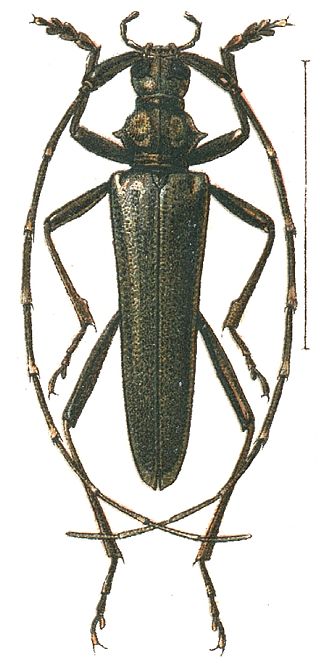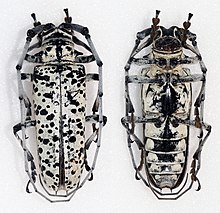
The Prioninae are a subfamily of Cerambycidae. They are typically large (25–70 mm) and usually brown or black. The males of a few genera sport large mandibles that are used in fights with other males, similar to stag beetles. These beetles are commonly nocturnal and are attracted to light. The majority of the Prioninae whose biology is known are borers whose larvae feed on rotting wood or roots.

Lamiinae, commonly called flat-faced longhorns, are a subfamily of the longhorn beetle family (Cerambycidae). The subfamily includes over 750 genera, rivaled in diversity within the family only by the subfamily Cerambycinae.

The Disteniidae are a small family of beetles in the superfamily Chrysomeloidea, traditionally treated as a group within the Cerambycidae.

Cerambycinae is a subfamily of the longhorn beetle family (Cerambycidae). The subfamily has a world-wide distribution including: Asia, Europe and the Americas. Within the family, the only subfamily of comparable diversity is the Lamiinae.

Dorcasominae is a subfamily in the longhorn beetle family Cerambycidae. There are about 14 genera and more than 30 described species in Dorcasominae, found mainly in Asia and Africa. These genera are sometimes considered members of the tribe Dorcasomini, which would be the only tribe of this subfamily. This classification is in accordance with the TITAN Cerambycidae database, Catalogue of Life, and Photographic Catalog of the Cerambycidae of the Old World. It is similar to that of Bouchard et al. in "Family-group names in Coleoptera", 2011.
Atelopteryx is a genus in the longhorn beetle family Cerambycidae. This genus has a single species, Atelopteryx compsoceroides. It is found in Argentina, Brazil, and Paraguay.

Eburiini is a tribe of beetles in the subfamily Cerambycinae, synonymous with the tribe Heteropsini Lacordaire, 1868, containing the following genera:
Heteropsini is a tribe of beetles in the subfamily Cerambycinae, synonymous with the tribe Eburiini Blanchard, 1845, containing the following genera:
Heterops is a genus of beetles in the family Cerambycidae, containing the following species:
Sydax is a genus of beetles in the family Cerambycidae, containing the following species:
Aethecerinus is a genus of beetles in the family Cerambycidae, containing the following species:
Eurysthea lacordairei is a species of beetles in the family Cerambycidae. It was described by Jean Lacordaire in 1869.
Sydax stramineus is a species of beetle in the family Cerambycidae. It was described by Lacordaire in 1869.
Metaphrenon impressicolle is a species of beetle in the family Cerambycidae. It was described by Lacordaire in 1869.
Trypogeus is a genus of Long-Horned Beetles in the beetle family Cerambycidae. There are about 14 described species in Trypogeus, found in China and Southeast Asia.

Deliathis is a genus of flat-faced longhorns in the beetle family Cerambycidae. There are about 15 described species in Deliathis, found in the Neotropics.

Deliathis buquetii is a species of beetle in the family Cerambycidae. It was described by Tasté in 1841, originally under the genus Taeniotes. It is known from Honduras, Belize, and Mexico. It contains the varietas Deliathis buquetii var. mira.

Deliathis nivea is a species of beetle in the family Cerambycidae. It was described by Henry Walter Bates in 1869. It is known from Nicaragua, Guatemala, Costa Rica, Honduras, and Panama.
Deliathis quadritaeniator is a species of beetle in the family Cerambycidae. It was described by White in 1846. It is known from Panama, Costa Rica, Ecuador, Colombia, and Venezuela.
Deliathis neonivea is a species of beetle in the family Cerambycidae. It was described by Stephan von Breuning in 1943, but the original name is a junior homonym of Deliathis nivea so its name was replaced in 2018. It is known from Mexico.









